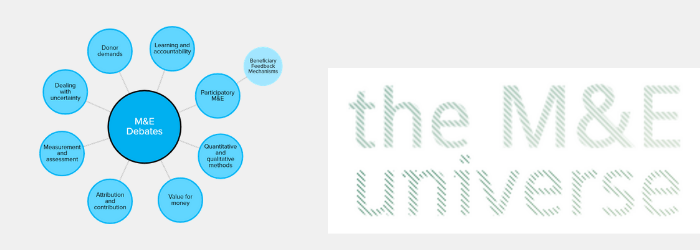
The M&E Universe, INTRAC’s free online resource for M&E practitioners, has expanded to include a new section on M&E debates. The 10 new papers join the seven sections previously released.
New to the M&E Universe? Visit our Project page to find out about this resource, and get a quickstart guide to using it.
What’s in the new section?
The new set of papers are different from the other papers in the M&E Universe. They deal with issues that cut across many of the other papers. They are not aimed so much at helping people to understand discrete monitoring and evaluation (M&E) subjects, but are rather designed to help people think more broadly about the subject.
Some of the papers cover issues that have been hotly debated throughout the past forty years. These include papers on the relative merits of quantitative and qualitative methods, how best to assess CSO contribution towards social change, how far M&E is (or should be) influenced by donor organisations, and whether M&E should be carried out primarily for learning or accountability.
Other papers cover issues that are cross-cutting, and summarise common themes across many different papers in the M&E Universe. These include papers on participatory M&E, the difference between measurement and assessment, and how to deal with uncertainty.
The final papers provide some explanation and practical advice in two subjects that have come to prominence in recent years, and that affect how M&E is conducted in many projects and programmes. These are the use of M&E processes to demonstrate value for money, and the use of beneficiary feedback mechanisms within M&E.
Already using the M&E Universe? We would love for you to contact us with your stories of how it is impacting your monitoring and evaluation work.
Who are the papers for?
These papers are specifically designed for anyone in a CSO/ NGO, large or small, who is responsible for managing, developing and/or adapting and improving M&E systems for their projects, programmes or organisations. However, we hope they will also be useful for the wider M&E community more generally.
Although many of the papers in the M&E Universe deal with discrete issues such as indicators and baselines, and are designed for entry level, the papers in this section of the M&E Universe assume some existing knowledge of M&E, and are more designed for those wishing to engage with some of the key assumptions and principles that underpin M&E.
The new papers are available now.
- To keep up with INTRAC news, including about the M&E Universe, by signing up to our mailing list